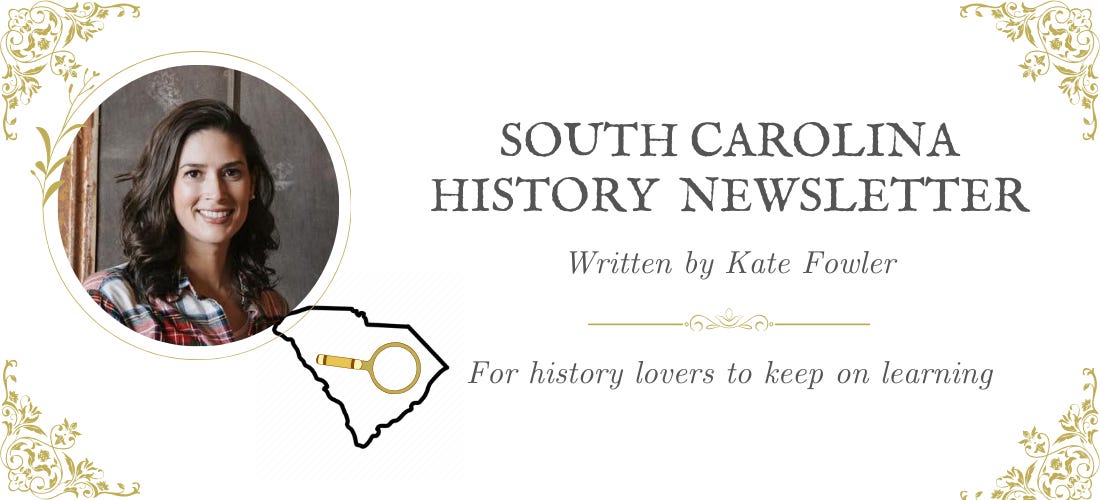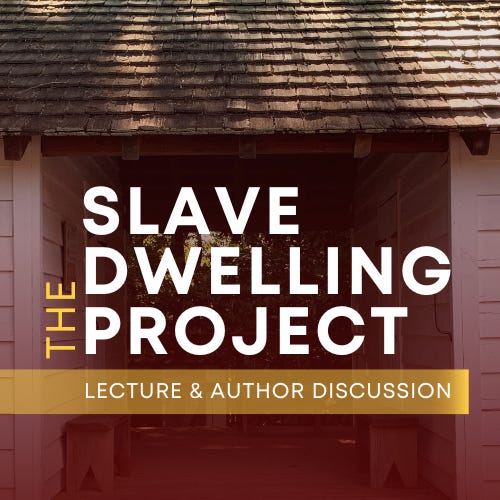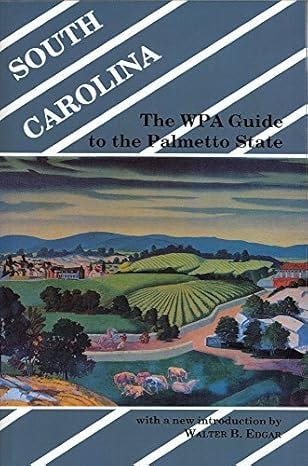#120: Presidential Candidates from SC, The Slave Dwelling Project, and The WPA Guide to the Palmetto State
For South Carolina history lovers far and wide! Published weekly on Monday mornings. Enjoy weekly SC history articles, interviews w/ experts, book recommendations, and upcoming SC historical events.
Dear reader,
Welcome to SC History Newsletter #120!
Tomorrow is Election Day and I hope everyone has (1) already voted or (2) made a plan to vote!
In honor of Election Day, I decided to write below about presidential nominees who have come from our great state of South Carolina.
As always, I’d like to welcome the following new subscribers to our community. Thank you for your interest in South Carolina history!
rsmith1
beatenpaths2024
Lanefuller
tally.johnson
ryrywest8
frankiecmclean
marendaallen
teresabetsill
New friends! If you are new to the newsletter, please note that there are over 100 previous SC History newsletters on topics ranging from the founding of Charleston, sunken Confederate submarines, railroad tunnels filled with blue cheese, and so much more! I encourage you to take a look at our archive here.
Send me your topic ideas: I love it when subscribers write to me! Have a SC History topic or question you’d like for me to write about? Just reply to this email and let me know!
Join us on social: Please join us & keep the conversation going by becoming a member of our SC History Newsletter Facebook Community here! I can’t wait to meet you. :)
If your email “cuts off”: In your email app or website, if my emails “cut off” for you, please click the title of the email and it will take you to the full post on the Substack. I don’t want you to miss any content!
And now, let’s learn some South Carolina history!
Yours truly,
Kate
(Writing from Greenville, SC)
➳ Featured SC History Events
Please note our featured SC History Event below, and click here to visit my SC History Events Calendar that organizes all the upcoming SC history events I have discovered.
Please let me know if you’d like to add an event to the calendar! Reply to this email to send me your events.
Event Recommendation of the Week:
Tuesday, November 12th at 5:30 pm | “Sleeping with the Ancestors: The Slave Dwelling Project” | Bluffton, SC | Tickets are $35
“Join us for an unforgettable evening as Joseph McGill, Jr., founder of the Slave Dwelling Project, shares powerful stories from his journey preserving and honoring the history of enslaved people through the restoration and protection of slave dwellings across the United States. In this multi-media talk, McGill will chronicle his unique experiences spending nights in these historical structures, shedding light on their significance and the lives of those once forced to live within them.”
➳ SC History Book, Article, & Movie Recommendations
“South Carolina: The WPA Guide to the Palmetto State” by Walter Edgar
(A note from Kate: this book was recommended to us by our last podcast guest, haunted historian Tally Johnson. Adding it to my reading list!)
Publisher’s description:
“This guide was one of the 48 detailed guides of states written by local researchers and writers through the Federal Writers Project created in 1935 as part of the New Deal's Works Progress Administration. This is a time warp posterity guide to each state. This reprint of the original South Carolina: The WPA Guide to the Palmetto State is divided into 3 sections: 19 essays on a variety of topics from history to cooking; detailed descriptions of 11 towns with populations over 10,000, and 21 detailed guided tours to all sections of the state. The reprint is updated with the new highway numbers for each tour. According to the author, this Guide is a product of its times. The essays and tours mince no words describing SC's poverty or reality of the world in which class and race played major roles. Edgar says: "This book accurately described the state as it was - not as romantics wanted it to be." An Amazon review states: ‘Although I haven't quite finished this WPA Guide, it is quite a good source of factual information on the State of S.C. in 1938. It does not "sugar coat" the attitudes of the day and "practices" being applied to everyday living for all that lived in the State. A lot has changed and progressed, but some things did not change.’”
Have you read this book? Tell us your review! Leave a comment below!
➳ SC History Topic of the Week:
How many U.S. presidential candidates have been from South Carolina?
John C. Calhoun (1782-1850)
Born in Abbeville County, South Carolinian John C. Calhoun was arguably one of the most important political figures of the 19th century.
A graduate of Yale College in 1802 and a well-respected lawyer, he represented South Carolina in Congress in both the House of Representative and the Senate, and he served as a Secretary of War under President James Monroe, and Secretary of State under President John Tyler.
Calhoun also served as Vice President TWICE — the first time under President John Quincy Adams and the second time under President Andrew Jackson!
He was a staunch defender of state’s rights and the institution of slavery — as he was a slaveowner himself.
Calhoun ran for president in 1824 against Andrew Jackson, John Quincy Adams, Henry Clay, and William Crawford who were all running as Democratic-Republicans (though representing different factions within the party).
When it became clear to Calhoun that he would not secure the presidency, he put his hat in the ring for the Vice Presidency and was easily elected by the Electoral College (in a separate process, VPs were chosen through the Electoral College system at that time).
As the editor of The Papers of John C. Calhoun, Dr. Clyde Wilson has stated that Calhoun was “the only Vice-President in our history who has been elected both overwhelmingly and in his own right rather than as the creature of a political party or Presidential nominee, an event made possible by a temporary hiatus in the two-party system.” Furthermore, “It could be said that Calhoun was Vice-President because of his importance, not important because he was a Vice-President.”
His supporters, “the Calhounites,” together with the supporters of Andrew Jackson aided in forming a new opposition party, the Democratic Party, an updated version of Jeffersonian-Republicanism.
After serving as Vice President twice (1825-1829, then 1829-1832), and 10 years in the Senate (1833-1843) —19 years after his first run — Calhoun made one last bid for the presidency in 1843 at age 60.
The land that made up Calhoun’s plantation, Fort Hill, would later become Clemson University. From Clemson’s website:
“FREE TRADE; LOW DUTIES; NO DEBT; SEPARATION FROM BANKS; ECONOMY; RETRENCHMENT, AND STRICT ADHERENCE TO THE CONSTITUTION,” read the 1843 campaign slogan of the Honorable John C. Calhoun during his last major bid for the presidency of the United States. These few phrases illustrate principles that Calhoun espoused during his career that continue to be relevant in contemporary America.”
Though he never won his party's presidential nomination, Calhoun continued to be influential in both state and national politics until his death.
In a letter to his daughter Anna Calhoun Clemson two years before his death, Calhoun “summed up his life work and career”:
“I hold, the duties of life, to be greater than life itself ... no appreciation of my efforts, either by the present, or after times, is necessary to sustain me in struggling to do my duty in resisting wrong, especially where our country is concerned.”
For more history on John C. Calhoun, please see SC History Newsletter #99 (click here)!
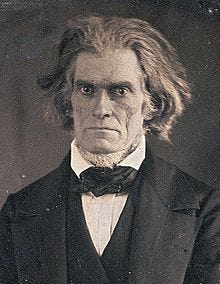
Strom Thurmond (1902-2003)
Born in Edgefield, South Carolina, Strom Thurmond would become one of the longest serving Senators in U.S. history — serving for 48 years from 1954-2003. He also served as Governor of South Carolina from 1947-1951.
Thurmond ran for president in 1948 as a “Dixiecrat” against Democrat Harry Truman. His vice-presidential nominee was the Governor of Mississippi, Fielding L. Wright.
Thurmond ran for president on a platform of protecting states’ rights. He and his supporters were also against the growing civil rights movement.
From his presidential campaign flier below:
“These two courageous men have taken a firm stand for Constitutional, States' Rights Democracy. They are now fighting for the way of life that has made this the greatest nation of free men and women in the history of the world. They appeal to Americans in all states, who believe that individual freedoms and human rights are dependent upon Constitutional, States’ Rights government, to rally behind them and to assist in this fight for the way of life Americans have long enjoyed and under which our nation has prospered for over 150 years. They deplore Truman's, Dewey's, and Wallace's cheap political appeal to minority groups and the willingness of these three men and their fellow-travelers to desert Constitutional government and States' Rights—and to thereby jeopardize the security, tranquility and unity of the nation—in order to win votes from un-American minorities... Now is the time indeed—to...
GET IN THE FIGHT FOR STATES' RIGHTS!”
Thurmond won four states and 39 electoral votes, showing the regional support for his platform, though he lost the overall race to Harry S. Truman.
For a longer history of Strom Thurmond, please see SC History Newsletter #86 (click here)!
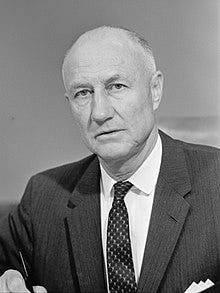
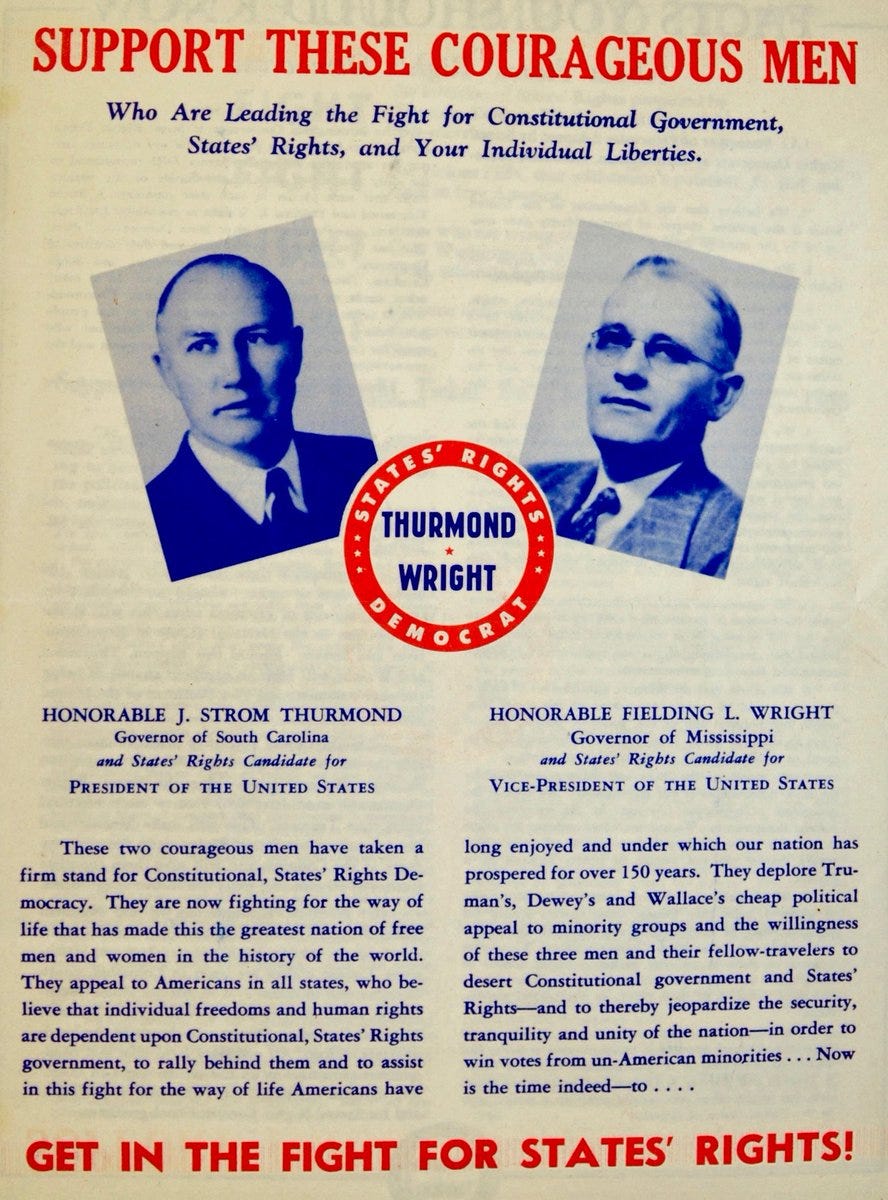
Lindsey Graham (b. 1955)
Born in Seneca, SC and raised in Central, SC, Lindsay Graham has been a U.S. Senator for South Carolina since 2002. He previously served in the House of Representatives from 1995-2003.
In fact, when Strom Thurmond (who we just learned about above) retired from office in 2002, Lindsay Graham ran for Thurmond’s Senate seat and won with 54% of the vote.
Graham ran for president in the 2016 Republican primary but struggled to gain traction with supporters and was ultimately excluded from the main Republican debates. In December of 2016, he suspended his race.

Nikki Haley (b. 1972)
Born in Bamburg, South Carolina, Nikki Haley is the former Governor of South Carolina and served as the U.S. Ambassador to the United Nations under President Trump. Haley also served in the South Carolina House of Representatives from 2005-2011.
Haley was the first Indian-American to hold office in South Carolina.
On February 14, 2023, Nikki Haley announced her candidacy for the 2024 Presidential Republican nomination, emphasizing her background in both state leadership and international diplomacy.
On March 6, 2024, Haley dropped out of the presidential race. She stated:
"I am filled with the gratitude for the outpouring of support we've received from all across our great country, but the time has now come to suspend my campaign. I said I wanted Americans to have their voices heard — I have done that. I have no regrets. And although I will no longer be a candidate, I will not stop using my voice for the things I believe in."
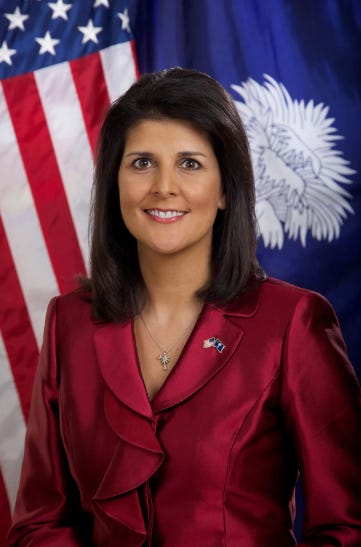
All the best to everyone on this Election Week!
➳ Sources — SC Election History
"Amendment 12: Electing the President and Vice President." Reagan Library, www.reaganlibrary.gov/constitutional-amendments-amendment-12-electing-president-and-vice-president. Accessed 1 Nov. 2024.
Biography of John C. Calhoun. Clemson University, www.clemson.edu/about/history/bios/john-c-calhoun.html. Accessed 1 Nov. 2024.
"Calhoun, John Caldwell." Office of the Historian, U.S. Department of State, history.state.gov/departmenthistory/people/calhoun-john-caldwell. Accessed 1 Nov. 2024.
"John C. Calhoun." American Battlefield Trust, www.battlefields.org/learn/biographies/john-c-calhoun. Accessed 1 Nov. 2024.
"John C. Calhoun: Featured Biography." United States Senate, www.senate.gov/senators/FeaturedBios/Featured_Bio_Calhoun.htm. Accessed 1 Nov. 2024.
"Lindsey Graham." Encyclopaedia Britannica, www.britannica.com/biography/Lindsey-Graham. Accessed 1 Nov. 2024.
"Nikki Haley." Encyclopaedia Britannica, www.britannica.com/biography/Nikki-Haley. Accessed 1 Nov. 2024.
Sabin, Paul. "When Did the Vice Presidency Stop Going to the Runner-Up?" Smithsonian Magazine, 20 Mar. 2016, www.smithsonianmag.com/smithsonian-institution/when-did-vice-presidency-stop-going-to-second-place-ask-smithsonian-180957199/. Accessed 1 Nov. 2024.
"Strom Thurmond." Encyclopaedia Britannica, www.britannica.com/biography/Strom-Thurmond. Accessed 1 Nov. 2024.
I always want to improve my work. Answer the poll below to give me your review of today’s newsletter. I also welcome your suggestions for new content! Simply reply to this email with your ideas. Thank you!




